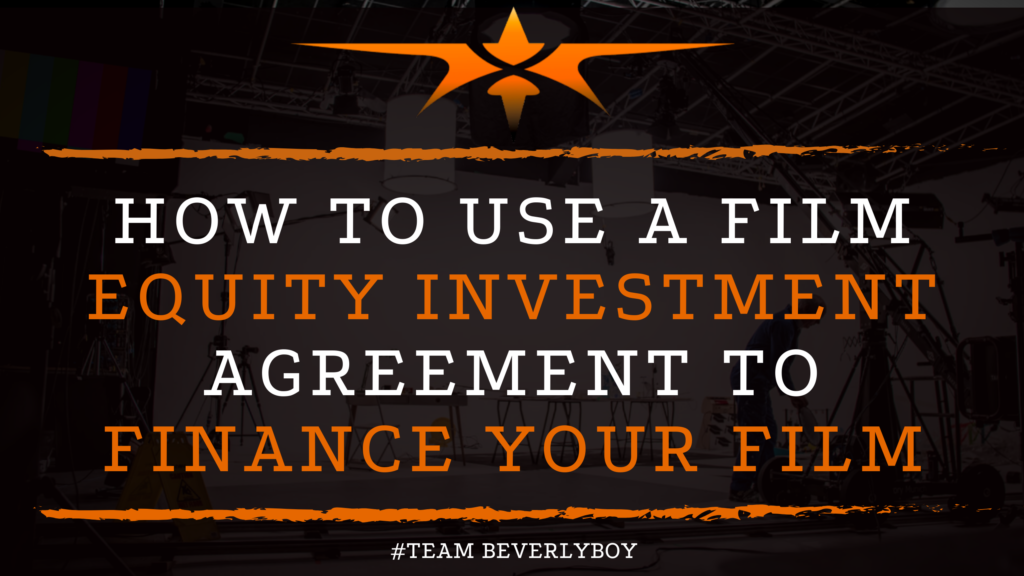How to Use a Film Equity Investment Agreement to Finance Your Film
Film investors are aware of the risks involved in putting their money behind a film project. But they still want to be sure that everything possible is done to ensure their investment funds are managed properly. Learning how to use a film equity investment agreement to finance your independent film project may provide the missing link that you need to finance your film project.

And move forward with production while equally providing your investors with the peace of mind that they can trust their investment to be properly managed.
But if you’re new to the world of independent film financing, and the many avenues involved? The entire process might seem overwhelming at first.
What is a Film Equity Investment Agreement?
Equity financing, or equity investments, involve the investment of money to a film project. In exchange for ownership interest in the film and interest in any profits that may be derived from the later exploitation.
Thus, a film equity investment agreement represents the deal made between the film producer and the investor. Outlining the details of the investment being made. As well as any ownership interest that may be exchanged as part of the agreement.
This agreement provides you with the ability to set forth the terms that are most suitable for your financing situation. While proving to investors that you’re aware of the important contractual steps required. In order to move forward with investment financing.
The film equity investment agreement is a stepping stone. One that should be executed prior to any investor providing funds for your project.
What Should I Include in the Agreement?
The film equity investment agreement is likely to be drawn up by a professional film and entertainment attorney. Or by your production attorney if you have one. However, regardless of who produces your investment agreement?
What’s most important is that the terms are set for as YOU wish. And that your continued ownership interest in your film is maintained.
We recommend you work closely with a legal professional to draw your investment agreement up as the film business is risky. And it’s best to have that reassurance that all of the important legal formalities have been covered.
Consider This
Think closely about the individual details of the agreement that matter most to you. This will likely be those relative to the amount of investment to be procured from the investor.
The amount of or percentage of ownership interest in the production that will be given in exchange for the equity financing investment. And all pertinent details regarding how decisions about the future of the film will be made and who will be involved.
Maintaining Control of Your Film
As the filmmaker, you want to ensure that you will remain in control of your project. After all, you’re the one that has already put in so much time and effort to get this far.
And you’ll want to continue to be the one that leads the way in approval over any creative matters that arise out of the remaining process of production.
Just because the equity investment is backed by shares in the company does not mean that you have to relinquish your ability to make decisions and maintain full control over the creative needs of the production.
Passive Investors
Passive investors, such as those that you enter into a film equity investment agreement with, may stake a part of ownership in your film.
But your agreement should state that becoming an investor does not equate to becoming the creative lead on the project. Of course, your agreement should accomplish this in not so many words.
Terms of the Film Equity Investment Agreement

By offering an equity investment the film investor shares the risk, and the reward. That might come from the film project alongside with the filmmaker. If the movie is a big hit, the investor will recuperate their investment and possibly a share of the profits, too.
If the movie fails or doesn’t do well, the investor may lose their investment but the producer of the film is under no obligation to return the investment funding.
Securities
Sometimes referred to as securities. The interest in the production company that the film investor puts his money in is done so. Without the intention of managing or otherwise running the business.
However, it’s very important for the film equity investment agreement. To clearly outline the terms of the agreement that is being made. And to clearly display or disclose any potential risks that the investor should be aware of.
Most of the time, your investment agreement will need to have a limited liability clause within it. That alleviates the investor from any potential loss above and beyond the value of their investment.
Most investors will request that this clause be contained within any such agreement to protect them from any extended claims against them for example, if an injury occurred on set and a lawsuit was filed the investor would not be liable.
SEC Regulations
In order to sell securities as part of your film equity investment agreement you’re going to need to follow SEC regulations. The U.S. Securities and Exchange Commission (SEC) is responsible for protecting investors at the federal level.
And will require that you follow their rules and regulations if you’re going to employ equity financing for your production. However, the SEC has enacted several exemptions from registering for filmmakers.
Specifically when securities are offered to investors residing within the same state or when other specific guidelines can be met.
In Summary
If you’re not familiar with the rules of SEC registration, or the guidelines of offering securities for investment, you’re not alone! Many filmmakers are not fully aware of how this complex doctrine works and the rules and regulations regarding it.
Before you move forward with any film equity financing, the selling of security interest in your production. Or the acquisition of any investments you should work closely with an entertainment attorney.
To ensure that you’re following all appropriate rules and regulations as a failure to do so could get you into serious legal trouble.
Learning how to use a film equity investment agreement is certainly a big step for any independent filmmaker. But it’s a step that can lead you in the right direction toward gaining the funds you desperately need in order to produce your feature film.

